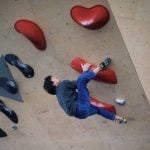Behind the Desk…is a series that interviews people who are part of the climbing industry—those who run companies, manage staff, create innovative new products, and own gyms. While some gyms have reopened, other gyms, including Reach Climbing in Philadelphia, remain temporarily closed during the Coronavirus (COVID-19) crisis. So, CBJ reached out to the owner of Reach Climbing, Michael Feinberg, to talk about the ongoing pandemic and get some details about creative ways Reach is keeping members engaged.

Name: Michael Feinberg
Title: Owner, Reach Climbing
Location: Philadelphia, Pennsylvania
CBJ: Can you frame this pandemic a bit by explaining specifically how it has affected Reach Climbing?
FEINBERG: As a young gym, the pandemic has put us in a difficult position to say the least. We have been closed since March 15, and next week will be Reach’s first anniversary. We had so much momentum with building a growing community and staff. It’s tough to see something like this stop our progress. We have been able to retain all full-time employees through the lockdown, but unfortunately we had to let the part-time staff go. The decision was really difficult, but there was no way to keep everyone on. At this point we are looking for a light at the end of the tunnel.
Our area of Pennsylvania continues to be under a stay-at-home order through early June. It is unlikely gyms will be allowed to open when that is lifted. The most difficult thing is not knowing when it will end. The feeling is really frustration over the uncertainty of state regulations and their impact on our future. All that being said, the community has been amazing: laid-off staff asking how they can help, members contributing any way they can, etc. That part has been really uplifting.
CBJ: Speaking of staff, how does a gym owner deal with the team in a time like this?
FEINBERG: There was the initial shock of the closure and getting past the layoffs. Nothing is harder than having to let people go—even if the intention is to eventually hire them back. Those that remained bonded in a way I hadn’t seen in almost a year of them working together. We also had to pivot dramatically to the needs of the community. Job descriptions went out the window as the staff was pushed into creating online content and researching safety protocols.
Our goal during the closure is simple: Keep the community engaged and try to provide value. We did this by continuing our fitness class schedule online, providing physical therapy/recovery videos, training routines for members, interviews with local climbing leaders, humorous parody videos. Here is a great example. The staff had to turn into interviewers, editors, and online gurus. It’s a new world, but I am proud of the work they have done.

CBJ: Your Gym is doing a Drive-In Movie Night to engage the community but still adhere to social distancing. I’ve never heard of a gym doing a drive-in before. Where did that idea come from?
FEINBERG: We wanted to do something special for our anniversary. Our staff was brainstorming and our Director of Routesetting brought the idea. We really wanted to engage the community and safely bring people together. We are hanging a 20-foot screen in our parking lot and allowing up to 40 cars to attend. The response has been amazing. All attendees will be given a Reach-branded mask, drink Koozie, and have the option to purchase new shirts designed from a recent online contest.
CBJ: What’s your gut feeling about the future of the indoor scene…all these gyms reopening with limited capacity and spread out routes? Is this what indoor climbing will now look like in perpetuity?
FEINBERG: I hope not, but that’s the way it looks for the foreseeable future. We are all looking toward those gyms that are fortunate enough to reopen to see what works and what doesn’t work. Reach is positioned well, at least in the sense that we are a modern, open gym; excess space was built into the design for comfort. We have much more room than some of the older or more cramped bouldering gyms. This gives us some comfort, but at the end of the day climbing is a social sport. Gyms are social—interaction and community are encouraged. There will always be demand from existing climbers, but the sport can’t grow under these conditions.

CBJ: Something that is not getting talked about a lot with these reopening protocols is how youth teams will be impacted. I’d enjoy hearing your thoughts on this as it relates to your gym.
FEINBERG: We have spent a lot of time thinking about this. We were scheduled to host the USA Climbing Youth Sport and Speed National Championships for a second time this July, which unfortunately was called off last week. I am a product of the youth climbing system and kids programming has always been a priority for us. From the beginning of the closure we’ve maintained our team practice schedule. All practices are done through Zoom with the head coach three times a week. We feel this is worthwhile for a number of reasons. The kids keep up a level of fitness during quarantine, the camaraderie of the team is maintained, and the parents are relieved of duty during this time (as a parent with daycare closed, for me this would be huge). In this way we hope to be keeping the team together.
The challenge will be how the initial in-person practices will be structured. Groups will likely need to be limited. We are also fortunate in that one of our expansion projects is a youth-specific training facility located next to our main gym. This will allow further spread of our user base and relieve pressure in the principal facility.
Share your story
Are you leading a climbing gym or brand through this unprecedented period? Or, do you work in the industry and have a story that others could benefit from hearing? If so, please contact us and tell us about it.














